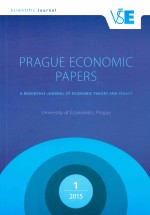Publications
31 Publications
Labor Market Institutions and Their Effect on Labor Market Performance in the New EU Member Countries
This paper focuses on the role of labor market institutions in explaining different labor market developments in European countries, paying special attention to the new EU member countries. This may allow us to analyze the effects of various institutional setups and their changes to major labor market indicators. We complement several studies from the late 1990s by using more recent data that allow us to compare institutional setups from the mid-1990s and early 2000s in both old and new EU member states. We es…
Topics: Economy
Labor Institutions and Their Impact on Shadow Economies in Europe
This paper analyzes the role of labor market institutions in explaining developments of shadow economies in European countries. We use several alternative measures of the shadow sector to examine the effects of labor market institutions on shadow sector in two specific regions, the old and the new European Union member states. Comparing alternative measures of the shadow sector allows a more granulated analysis of the effects of labor market institutions. Our results indicate that the one institution that unam…
Topics: Economy
Labor Institutions and Their Impact on Shadow Economies in Europe
This paper analyzes the role of labor market institutions in explaining the development of shadow economies in European countries. The analysis uses several alternative measures of the shadow sector, and examines the effects of labor institutions on the shadow sector in two specific regions: new and old European Union member countries, as their respective shadow sectors exhibited a different development in the past decade. Although the share of the shadow economy in gross domestic product averaged 27.5 percent…
Topics: Economy
Well-being in the Czech Republic in an Aggregate Perspective
The article assesses well-being in the Czech Republic compared to other Visegrad countries (Slovakia, Hungary, Poland) and neighbouring Germany and Austria. By employing various approaches designed by several international organisations it takes an aggregate perspective to assess both the current well-being and its sustainability into the future. All the employed indicators that relate to current well-being evaluate the well-being in the Czech Republic as moderate among the OECD countries. The results indicate…
Topics: Standard of Living
The Minimum Wage: Labor Market Consequences in the Czech Republic
This paper aims to quantify the impact of the minimum wage on labor market performance in the Czech Republic. Using regional data for 1995–2004, it estimates the effect of the minimum wage adjusted for the regional wage differential on regional unemployment. Consequently, using detailed individual data from 2004/2005, we analyze the annual hikes in the minimum wage, which allow us to estimate employment probabilities for workers with a wage level at, or close to, the new minimum wage. The aim is to reveal wh…
Topics: Wages and Incomes, Work
Labour Market Participation: The Impact of Social Benefits in the Czech Republic and Selected European Countries
This paper aims to quantify the impact of social benefi ts on labour market participation in the Czech Republic and provides a comparison with selected European countries. It applies the logistic regression to estimate the probability of labour market participation depending on social benefits related to net wage of the individuals, controlling for individual and household characteristics. Our results indicate that the work disincentives via social benefi ts do exist in most of the included countries and they …
Topics: Wages and Incomes, Work, Social Policy
Page 2 of 2
